
About two dozen people stood on the corners of SE 26th Avenue and Powell Boulevard last night to protest plans to remove a pair of bike lanes. As big, wet snowflakes fell, people rang horns and bike bells and held signs high that read, “No backpedaling on our safety,” “It’s always biking season,” “Keep your hands off our bike lane” and “Vision Zero now”.
“Why are we getting rid of bike lanes? We should be improving them and getting more.”
— JJ Heldmann, mother of Cleveland High School student
As we reported yesterday, despite the fact that Portland Commissioner Dan Saltzman (who oversees transportation) does not think removal of the lanes will improve safety, the Oregon Department of Transportation is forcing the Portland Bureau of Transportation to take them out. (Note that ODOT has no jurisdiction over 26th. PBOT owns and manages that road. ODOT only has leverage here because of an agreement the two agencies signed in 2016.)
Last night’s rally was organized by The Street Trust and marked a significant ratcheting up of their action around this issue. The organization’s top policy staffer Gerik Kransky and their Executive Director Jillian Detweiler were among the attendees.
In an interview, Detweiler said she’s spoken to ODOT Region 1 Director Rian Windsheimer — yet she still hasn’t heard a clear justification for removing the bike lanes. “He expressed concern for bike safety,” she said, “But his plan seems to be to force people to 28th and that’s just not realistic. Bikes have a right to be here. Bikes will be here. And bikes need to be as safe as they can be when they are here.”
Detweiler says removing the bike lanes is “Completely unnecessary” and she worries once they’re gone drivers will only go faster. “And drivers won’t be looking for bikes,” she added. “These are meager bike lanes for sure, but they at least provide the bikes some space.”
Advertisement
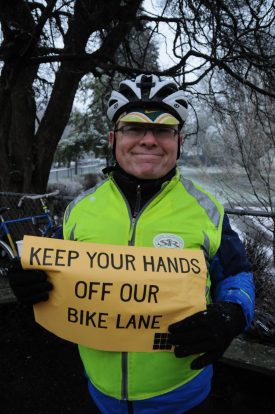
ODOT says they are making conditions safer because the lack of bike lanes will encourage more people to use a new, safer crossing two blocks east at 28th. But that’s not adequate, Detweiler says, “Greenways are great between places, but ultimately they are rarely where your destination is, and people have to be safe when they arrive at their destination. A high school could not be a more important destination.”
Southeast Portland resident JJ Heldmann showed up to the rally because she has a son who attends nearby Cleveland High School, which is directly adjacent to the bike lanes. Feldman’s son currently bikes to school, but she says he won’t use 28th because it’s too far out of the way (they live on 21st). “This intersection is scary,” she told me last night. “Why are we getting rid of bike lanes? We should be improving them and getting more.”
Tom Durkin lives in the area and he and his family have used the bike lanes since they were installed in the 1980s. His son graduated from Cleveland High and rode his bike on them everyday. Durkin is worried that if the lanes come out, people will still use them. “This is a traditional bike route and people know it’s here. For them to take away this infrastructure is unconscionable.” “I think people will continue to ride on the road here,” he continued, “And it will be unsafe.”
30-year-old Mt. Tabor area resident Andew Demarrias agreed with Durkin. “If they take it out I don’t think it will stop bike use, it’ll just make it more dangerous,” he said. “It sounds like flawed logic. They make the assumption that removing things will push people to other places. But really, this is the most convenient thoroughfare. People aren’t going to stop using it. You’ve really got to make both of them safe.”
So far no date has been announced for the removal. As for next steps, The Street Trust’s Detweiler says, “I’m hopeful we can get the plans revised.”
Here are a few more photos from the event:
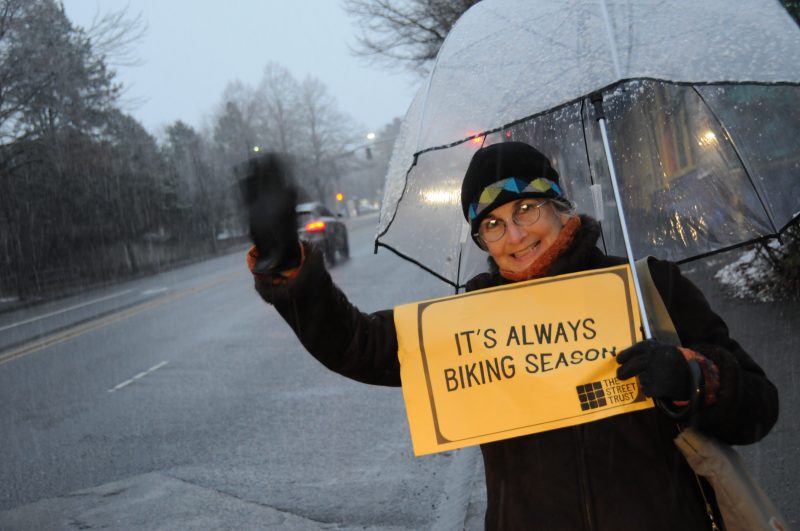
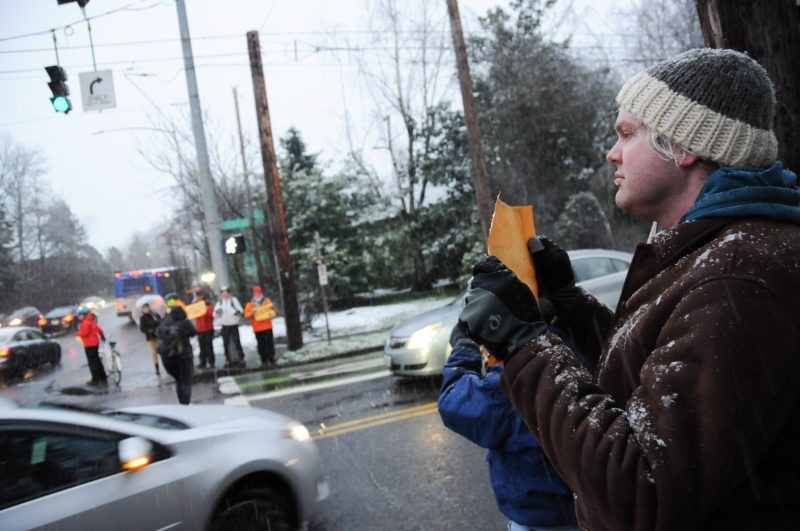

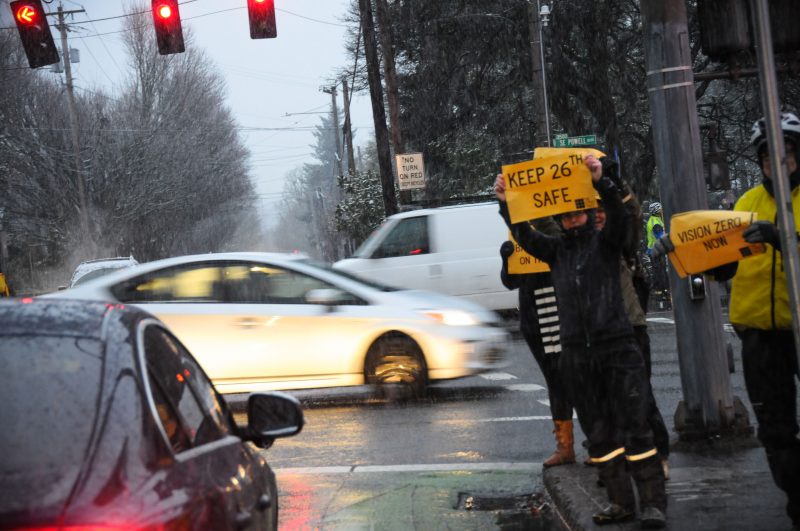
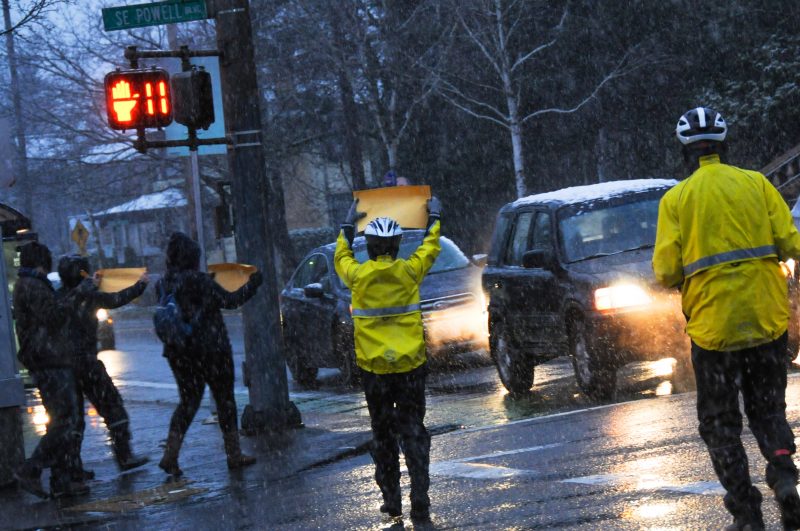
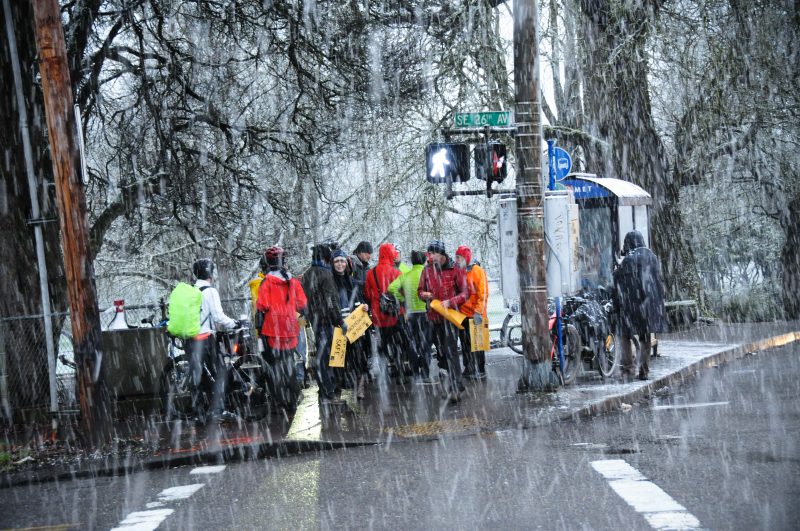
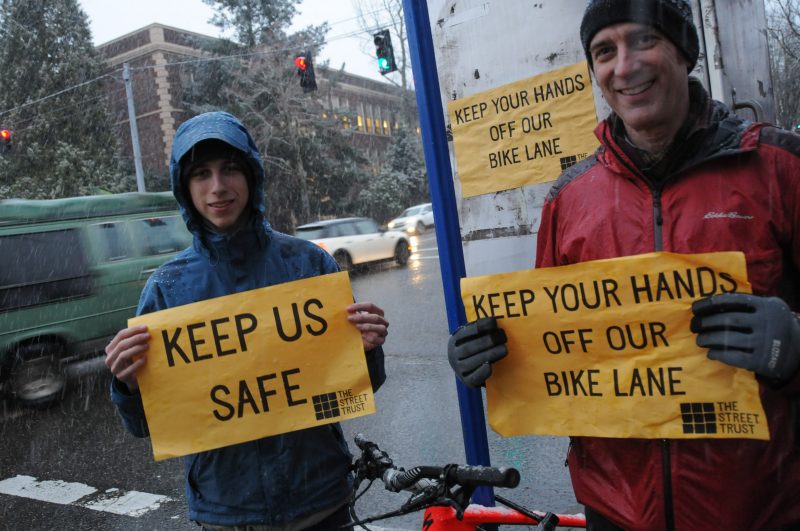
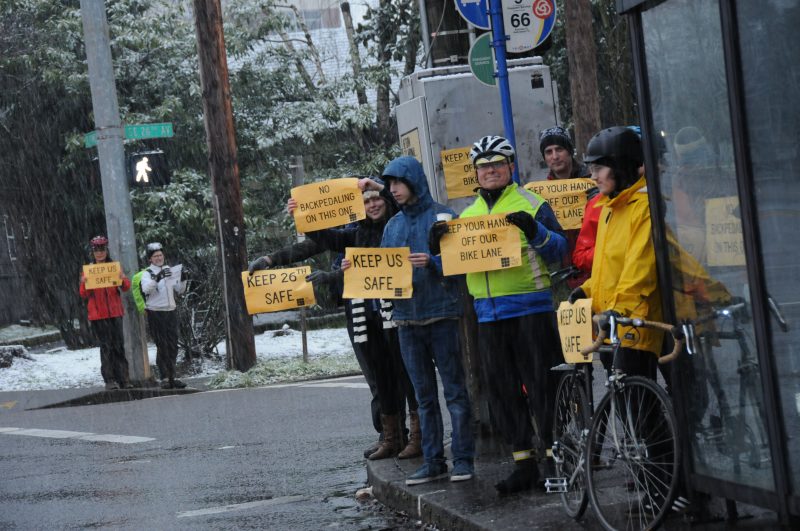
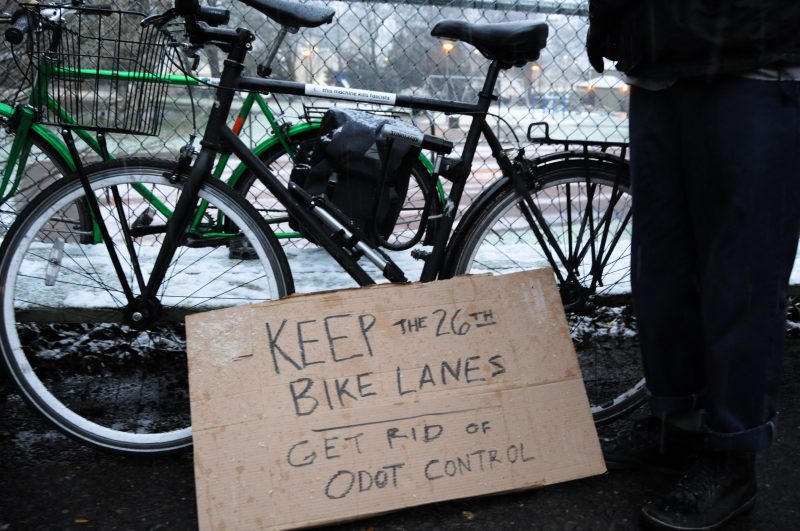
For more on this story, see our archives. And stay tuned, we’ve got more reporting on this coming soon.
— Jonathan Maus: (503) 706-8804, @jonathan_maus on Twitter and jonathan@bikeportland.org
Never miss a story. Sign-up for the daily BP Headlines email.
BikePortland needs your support.



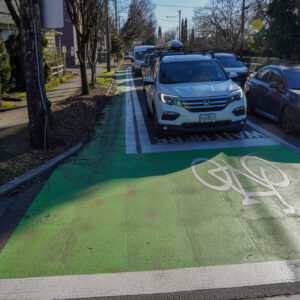
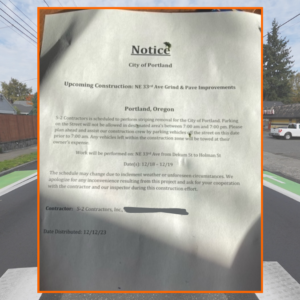
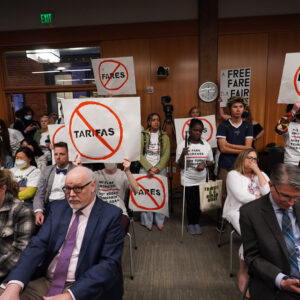
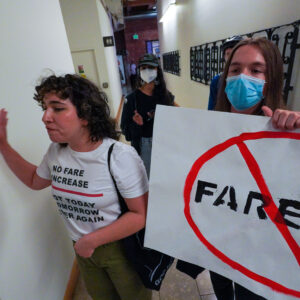
Thanks for reading.
BikePortland has served this community with independent community journalism since 2005. We rely on subscriptions from readers like you to survive. Your financial support is vital in keeping this valuable resource alive and well.
Please subscribe today to strengthen and expand our work.
As a thought experiment let’s ponder ODOT removing auto access, say, on Hawthorne Blvd.* Then let’s imagine auto-ists having to stand in the snow demanding it back.
#Car head.
* of course cars can and do drive down every one of the adjacent streets without risk, something that can’t be said for bikes trying to head South across Powell, so the parallel isn’t perfect.
An even closer analogy would be to propose removing auto traffic from Hawthorne and Madison where they cross MLK/Grand (an ODOT facility). I wonder if people would accept that?
MLK/Grand is a PBOT facility. Years and years ago it was ODOT, but not today.
That’s why it’s sooo much better than it was under ODOT’s management. I mean, it is better, right?
amazing that ODOT does this to people
I would genuinely be interested in an effort that tallied the times ODOT got it right, managed to genuinely get the bike constituency what it wanted or deserved. Anyone?
One example is the under crossing of Division St. on the I-205 MUP. A $250,000 project.
Lombard Street, going one direction at least.
Interesting argument from ODOT. It parses as: We’re going to claim to make things safer by making a marginally safe street more dangerous so that people will choose a different route that doesn’t include this street.
To purposely make a street more dangerous in hopes of removing all cyclists is both awful and doomed to failure. There will always be some people who will ride on any given stretch, especially when their destination is on that road, so all ODOT is really doing is purposely increasing the risk to people who ride.
They could at least come right out and say that. Many of us will still disagree with what they are doing, but it would open the door to a mutually respectful conversation. ODOT’s approach is a lot like the Republicans in Congress who make stuff up because their actual agenda (tax cuts for the wealthy and tearing up the safety net for everyone else) is a losing platform. ODOT realizes that their windshield perspective approach is a political loser, so they won’t come clean and be honest.
There are those of us who feel 26th will be safer without the bike lanes and with parking on both sides. Cyclists will have no alternative but to take the lane. This works fine on 20th/21st.
And it would have been an interesting discussion if ODOT had said something to that effect. From a tactical standpoint (yes, I’m assuming ODOT hates bicycles), that might have been a more effective rationale for them to pursue since it would have split the cycling advocates into factions and diminished their/our effectiveness.
To be honest, I personally prefer it when roads are narrowed by parking on both sides, especially when sharrow markings are put down (with bonus points for remembering to add the “Bicycles May Use Full Lane” signs) to remind the windshield folks that I’m right where I’m supposed to be as I roll down the middle of the lane. However, I expect that if this bike lane is removed we’ll see some migration to 28th, some folks staying put on 26th and, sadly, some folks throwing in the towel and getting back into their cars.
Yeah, but how fast are people driving their cars on 26th? And what kind of reaction time will that speed give them without a bicycle lane there to give bicycle riders a fighting chance?
My hope is that if the roadway is more encroached on by parking (rather than appearing pretty wide and open as it does now, despite the narrow lanes), speeds will drop, even without the presence of a cyclist in the lane.
That’d be great if it happens, Kitty. I have serious doubts that’s what will happen.
Take the lane and own it. Mandatory sidepath is a joke.
Not a solution for children or for elderly riders. Vehicular Cycling is a failed policy that does not serve all bicycle riders equally well.
Name two organizations that go by their initials. Both display anachronistic attitudes and defiance to wisdom, logic and compassion that end up getting many people injured and killed each year. Thats right folks, survey says, ODOT and NRA.
I thought you were angling for PBR.
Can anyone post the full ODoT analysis on line…I am just curious what other design / operational options (other than full removal or “no action”) have been studied and can be taken. Hopefully a FOIA request does not need to be done…
Have any other configurations been studied?:
– removal of 1 bike lane (use the extra space to improve the predominate bikeway flow) with traffic calming on the the shared remaining lane (if appropriate per safety);
– removal of the dedicated turn lanes (using the space to widen the bike lanes) and add turn restrictions [sign no right turn on red and no left turns]; and
– etc…
I’d certainly be interested in seeing the technical justification, since the cmfclearinghouse.org research is pretty clear that bike lanes and narrower general purpose lanes both improve safety. From the archives however, it’s not clear that odot ever claimed to have provided a technical justification. I’m also not clear what jurisdiction they have over this subject, other than the fact pbot agreed to it during a signal negotiation.
Any feel for The Street Trust doing a lawsuit regarding the bike lane removal? Could be an item for a GoFundMe campaign. The lanes may be subpar, but any removal of bike infrastructure without a challenge could embolden the departments involved to repeat the process in the future.
Perhaps it is time that bike and pedestrian advocates [and other supporters for local control] work through the legislature to change the [outdated] ORS giving ODOT less authority over city streets…the law could be written to just allow this for the largest cities, etc.
Cities in Washington State have greater authority over the operations of their arterials than similar sized cities in Oregon.
This is jurisdictionally confusing. We (PBOT) owns 26th Avenue. ODOT owns the signal. I am unsure how ODOT is forcing us to do this other than a handshake agreement that was made when we requested another stoplight to be installed for the greenway.
That’s just it Catie. The only way ODOT has leverage over PBOT in this situation is because of that agreement. I’ll hopefully have a major update to this story before the week is through that will explain a lot more about how we ended here. Stay tuned.
Thanks… This could use a lot of explaining. It was a bad agreement to start with, and its baffling to me why PBOT can’t change their mind and say “sorry, the data says bikes still use this, and its our road” If there is a huge backup because of the new signal, ODOT can help out with some signal timing or realize that their road is in a city and traffic happens.
I remember when this boneheaded agreement happened that PBOT soothed angry cyclists and neighbors by saying that’s exactly what they would do. The impression I got was “Not gonna happen! Just you wait! We’ll stop it!” coming from PBOT. The cynicism I felt at the time was apparently well placed.
I wish people would stop showing up to these events dressed like bike dorks. It’s much easier to “other” a group and therefore dismiss their point of view when they’re wearing specialized costumes. People will be more sympathetic to your cause if you look more like regular people. We need more people wearing normal clothes, no helmets, no hi-viz, etc. More parents with kids couldn’t hurt too.
A reasonable suggestion, as far as it goes, but did you show up in a non-dorky costume?
It was dark. Slush was falling. Rain pants and that raincoat made perfect sense to me.
Clicky Freewheel,
I agree with you in some ways. I’m a believer that more people in regular clothes would help the cause. But let’s not be so judgy. I think you should be a bit more sensitive to the context. These folks showed up in the snow and rain to make a bike route safer. Did you show up? Regardless of my feelings about fashion and culture, I would never choose to point this out in this context because of the weather and because of the fact that we need all the help we can get doing activism and these folks showed up to be heard. I really don’t care what they were wearing.
I am a dork and did not show up at all. But then my perspective is frequent views through the window of a #10 bus.
Is there anything stopping PBOT from removing the bike lane and painting sharrows? or removing the bike lanes, but adding diverters for motorized traffic a couple of blocks north and south of Powell? Or making it right turn only (except bicycles) from 26th to Powell both north and south bound? If PBOT wanted to create a safe route to bike here, it seems like they have some tools to use, even if ODOT takes away the bike lane.
PBOT policy is to use sharrows only on greenways, and not to use diverters on collectors.
Sharrows only on Greenways? That’s absurd. No wonder PDX is plateauing (or shrinking) in bike use. Sharrows, and Bikes May Use Full Lane signs, are most useful on collector-type streets because they are a very visible reminder to motorists that the lane is meant for everyone and one must deal with all traffic on a first-come, first-serve basis. In other cities, I really, really, enjoy riding on moderate-traffic streets that have sharrow markings. I get harassed much less on them than any other setting.
I totally agree. The policy is counterproductive.
This idea is not supported by research.
https://www.citylab.com/solutions/2016/02/sharrow-safety-bike-infrastructure-lane-chicago/460095/
Before concluding adding sharrows to 26th would be more dangerous than not doing so, I would like to better understand why crashes increased, and if those reasons would apply to SE 26th.
First off, thank you to the people who went out yesterday and protested, and thanks to Jonathan for covering it.
Second, I have several questions:
1. Is it just my imagination, or was big truck traffic restricted on SE 26th until only recent years? It seems to me that when we moved just off SE 26th in 2005, there was a negligible amount of big truck traffic–next to nothing. The street was much calmer in general, of course. Fewer drivers, less congestion.
2. How did UPRR get approval to move major operations to the Brooklyn Yard (in the middle of several neighborhoods, w/ poor freeway access), from the Albina Yard (in an industrial area under I405, with good freeway access)? That whole thing seemed to happen overnight, and with no neighborhood input. I would love to see some investigative reporting on that whole deal.
3. Were rules (if there were any) relaxed re: big trucks on SE 26th after the UPRR operations move, in order to facilitate the needs of the railroad (over the needs of the neighborhood)?
4. Is ODOT now using a situation they fostered and abetted (in service of UPRR and the freight industry) to argue SE 26th is now not safe for cyclists?
5. Is that crazy-making? (Yes)
The history of this really matters to me. I’ve never heard a satisfactory explanation for the community-bomb move of UPRR main operations from Albina Yard to Brooklyn Yard–a move that delivered countless ills and a whole lotta diesel exhaust into the laps of neighbors in the tightly clustered Hosford-Abernethy, Richmond, Eastmoreland, Woodstock, Sellwood and Brooklyn neighborhoods.
The big trucks don’t even fit in the lanes on SE 26th. They don’t fit on many of the neighborhood streets they’re swarming, trying to get to freeways from poorly situated Brooklyn Yard. It’s no wonder UPRR (and ODOT) want to make more room for the trucks, as they’ve allowed them to proliferate on the street unhindered for years now. I dread thinking of how many more trucks SE 26th will be expected to accommodate after the removal of bike lanes. I sincerely doubt that more street parking will be opened up, or that traffic calming will be introduced. They want a freightway. At least, that’s what it looks like.
SE 26th wasn’t always like it is now, as exemplified by the original 20s bikeway plan which stipulated SE 26th as the bikeway through Hosford/Richmond. The heavy, constant traffic is a relatively recent phenomenon, exacerbated by the development of SE Division and the proliferation of restaurants and bars there.
Bald One seems to be up on a lot of this, but I sure would appreciate some information of more investigation into it all. I think it matters–esp. as ODOT seems to have helped foster a situation they’re now calling “too dangerous” for cyclists, and is insisting on having the bike lanes removed.
Rachel is spot on. I really can’t think of any other reason for ODOT to be pushing SO had for this removal — there has to be some money and heavy leverage behind it. And it makes me sad/angry/frustrated and SCARED that these big polluting low-visibility bohemoths will be regularly travelling down a residential street even more than they do now AND interacting with very distracted and vulnerable pedestrians at an intersection that is ALREADY UNSAFE. I ride with these trucks regularly on a short block on SE 17th btwn McLoughlin and Holgate in a buffered bike lane and they are in a hurry and don’t play well with the ‘normal’ city traffic. The high school isn’t going anywhere. The community center right there isn’t going anywhere. Those new residential houses being built aren’t going anywhere. WHY are we adding more vehicle capacity instead of removing it?
Who can we ask these questions of and get real answers?
Good questions Rachel. I will add it to the list of theories I’m following. There are a lot of questions around this. Unfortunately as usual ODOT is opaque and it’s not easy to get answers.
To do this type of reporting takes more money and capacity than Bikeportland has at the moment. My dream is to have a reporter on staff and the funding to pay them to work on assignments like this. Right now this is essentially a one-person operation. I can barely keep my head above water!
I’m not dismissing your questions. Just trying to explain why it’s so rare to see investigative work here on Bikportland. At least now… I’m building for the future!
That wasn’t a goad for you, Jonathan–I should’ve been more clear about that! I’m in awe of how much you do, and with so little support. I really have no idea just how you manage it all. I was throwing it out there more generally. There’s a thread to this story that would seem to go back several years. It seems so disingenuous, to say the least, for an agency (ODOT) complicit in causing the problem (lack of safety for cyclists) to now be proposing elimination of bike facilities because of that very lack of safety. And yes, maxD—agreed. I’d also like to ask Sam Adams about the Albina Yard/Brooklyn Yard UPRR deal.
Imagine what BP could do with more paid supporters.
Hi Dan A.,
I imagine that a lot! I have a really exciting vision for the future of BP. It includes becoming a 501c3 nonprofit org. I plan to make more details public soon.
totally agree, but why do you assume it was ODOT and not PBOT accommodating the freight interests? PBOT seems plenty willing to encourage truck traffic here, they made the deal with ODOT, and they are not doing much to push back.
Even though sharrows are restricted to greenways, a few yellow diamond signs saying “Bicycles may use whole lane” would be useful on 26th.
The BMUFL sign is white and black because it is regulatory (i.e. has the force of law), not a yellow diamond, which is a warning sign.
PBOT has all the power to close 26th any length it wants to biking/walking. PBOT only has to remove bike lanes. Who is saying it can’t just close the whole road?
Really great to Street Trust out on the street protesting. I would also caution against moving freight traffic back to the Albina Yard. The North Albina yard is close to neighborhoods already overburdened by transportation pollution and is near the Rose Quarter Freeway Widening saga. The saga we are protesting as red herring for more money to go to local improvements instead expensive freeways. Sadly I went to the democratic open house with Tina Kotek, Lewi Frederick and Tanya Sanchez at PCC a week or so back and our representatives seemed to throw their hands in the air and not shake the boat at the state level to really question why the democrats in power are still funding ODOT with barrels of concrete loaded power over our local streets. In sum don’t be bicycling NIMBYs and move the problem somewhere else. Let’s go after ODOT. THANK YOU STREET TRUST we need your leadership !!!
They’re not going to move it back to Albina Yard–trust me. UPRR was hellbent on moving to Brooklyn Yard and really bullied it through, I can only imagine. But at least Albina Yard is in an industrial area, off lower Interstate and with freeway access. And the proximity of Brooklyn Yard to several neighborhoods, nestled right in there, cheek-by-jowl, beats Albina Yard’s proximity to residential areas by a long shot. It was an unconscionable move and it really felt like it was done in the wink of an eye, overnight, and with no neighborhood input. It’s had a tremendously negative impact on the neighbors surrounding Brooklyn Yard, and that relationship (with UPRR) was never hunky dory to begin with.
PBOT is also closing a bike lane on N Greelely between Going and Interstate. They will replace it with protected MUP that is, unfortunately, too narrow (10′), terminates on a path used as a driveway, and widens the lanes on Greeley to promote even higher speeds (!). I know it looks like ODOT is forcing the bike lane removal on 26th, but PBOT seems complicit. If they wanted to create safer streets that work for everyone, they would be narrowing the lanes and reducing the speed limit on Greeley, widening the MUP, adding bollards to keep personal vehicles off the existing MUP, and keeping the southbound bike lane so people riding bike have the option of taking a direct, fast route.
Until almost exactly a year ago, I lived a block away (I left town to work for a bicycle company in another state) near the Ship Ahoy.
I found the whole mess absurd. A buddy lost his leg here, which prompted action, but what action?
Not that anybody cares – they don’t! – but of all places Portland should be doing this kind of thing right. Screwing up this kind of project says a lot.
“Not that anybody cares – they don’t!”
Um, do you read bikeportland? We care!
I’m not local, so I don’t know the conditions, but it looks like the current configuration is minimal widths for all lanes; ~9.5′ travel, <5' bike, and, ~7' parking. That is usually a recipe for garbage infrastructure that doesn't benefit the bicyclist.
Sticking a cyclist in a narrow space between parked and moving cars does nothing to improve safety. In fact it can be demonstrated to be worse than a shared roadway. So why is there so much pressure to keep this lousy design? I find it ironic that the advocates would be so vocal to keep this, while also decrying poor design when even a buffered bike lane is proposed, because it isn't a "protected" bike lane.
I'm not trolling, but unless I'm missing something, this is a head-scratcher.